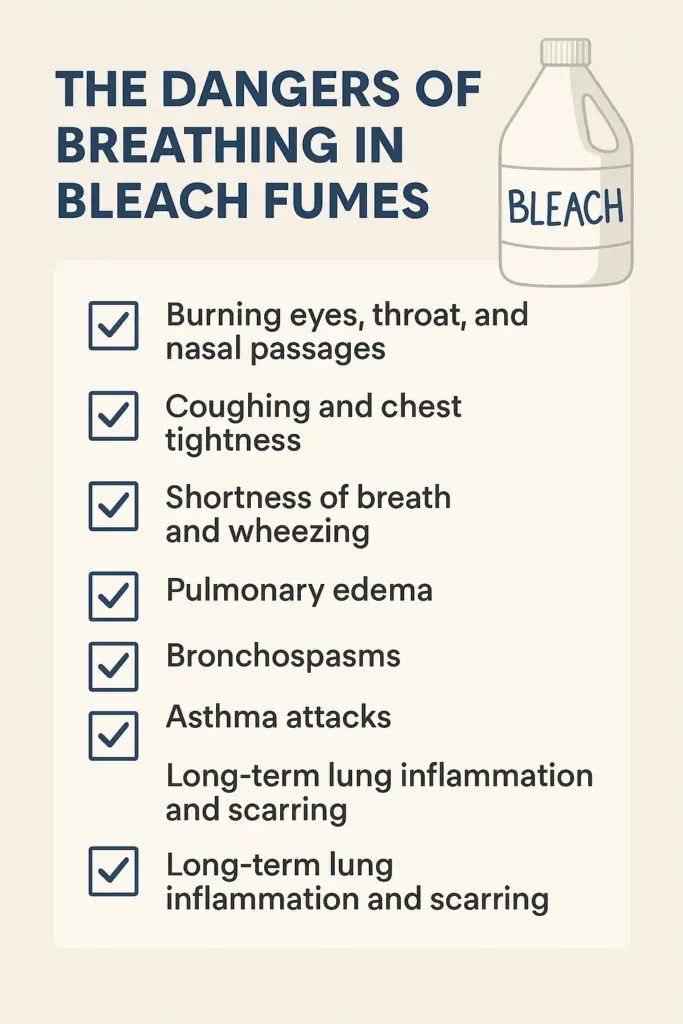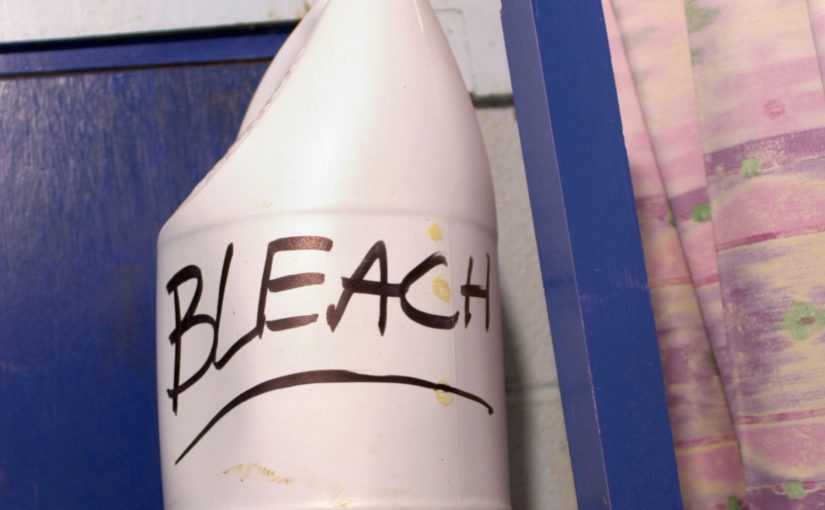Table of Contents
Is Breathing in Bleach Bad?
Yes, inhaling bleach fumes is detrimental as it exposes the respiratory system to sodium hypochlorite and chlorine gases, which can damage lung tissue and airways, leading to respiratory complications and chemical burns.
It can cause irritation to the eyes, skin, and respiratory tract, leading to symptoms like coughing, chest tightness, and in severe cases, respiratory distress.
Introduction
Many of us know someone who reacts strongly to the harsh smell of bleach. In my household, that person is my wife.
The mere presence of bleach-based cleaning products in our routine triggers an immediate and unpleasant response for her. Even a quick spray to disinfect a countertop or toilet can lead to intense discomfort — an almost instant headache, nausea, and a need to leave the room. It’s not just about disliking the smell; it’s a physical reaction that affects her ability to function normally.
Over time, we began to notice a pattern: whenever bleach was used, she’d feel sick — sometimes for the rest of the day. That experience made me ask: *how harmful is bleach, really, even when it’s just in the air we breathe?*
This led me down the rabbit hole of researching bleach exposure and how it affects the lungs, sinuses, and even the nervous system. What I found surprised me — especially how common these reactions are and how few people talk about them. If someone in your home is sensitive to chemicals or already has a respiratory condition, understanding the risks of bleach inhalation is essential.
Why Breathing Bleach Is So Dangerous
Bleach might seem like a simple household cleaner, but it contains powerful and potentially harmful chemicals. Most bleach-based products include sodium hypochlorite, which acts as a strong disinfectant but also creates risk when inhaled.
When bleach is:
- Mixed with acids (like vinegar or toilet bowl cleaners), it can release chlorine gas
- Used with ammonia (found in many glass or bathroom cleaners), it forms toxic chloramine vapors
- Sprayed in closed areas without ventilation, the fumes can become concentrated quickly
Once chlorine gas is released, it reacts with moisture in your eyes, nose, and lungs to create hydrochloric acid and other corrosive byproducts. These can cause immediate irritation and lead to more serious effects, such as:
- Burning eyes, throat, and nasal passages
- Coughing and chest tightness
- Shortness of breath and wheezing
With high exposure or prolonged contact, more dangerous symptoms may develop:
- Pulmonary edema – fluid buildup in the lungs that restricts breathing
- Bronchospasms – sudden airway constriction, common in asthma sufferers
- Asthma attacks – often triggered by even small amounts of bleach fumes
- Long-term lung inflammation and scarring
People with asthma, allergies, COPD, or other breathing issues are at significantly higher risk. But even healthy individuals can suffer if the concentration of fumes is strong enough or exposure lasts too long.
The bottom line: Breathing in bleach fumes isn’t just unpleasant — it can lead to serious, even life-threatening complications if proper precautions aren’t taken.
1
Effects of Breathing Bleach Fumes
| Short-Term Effects | Long-Term Effects |
|---|---|
| Coughing, choking | Asthma |
| Throat irritation | Respiratory infections |
| Burning eyes, nose, throat | Lung scarring |
| Wheezing, chest tightness | Chronic bronchitis |
| Nausea, vomiting | Lung cancer |

Exposure can irritate the eyes, skin, and respiratory tract. Short-term effects include coughing, choking, wheezing, nausea, and burning sensations. Long-term effects like respiratory infections, asthma, lung scarring, and even cancer can occur with repeated exposure.
Situations Where Bleach Inhalation Occurs
There are several everyday scenarios where inhaling bleach fumes becomes more likely — and potentially dangerous:
- Cleaning with bleach in enclosed spaces: Using bleach in small, poorly ventilated areas like bathrooms or closets allows fumes to build up quickly, especially when doors and windows are closed.
- Mixing bleach with other chemicals: Combining bleach with products containing ammonia, vinegar, or acids creates highly toxic gases like chlorine and chloramine. Even small amounts can cause severe respiratory irritation.
- Bleach spills and accidents: Knocking over a bleach bottle or using too much in a small space can release concentrated fumes and cause burning or irritation to the skin, eyes, and airways.
- Intentional misuse or self-harm attempts: In rare but serious cases, bleach is used in suicide attempts through ingestion or inhalation. This is extremely dangerous and requires immediate emergency medical care.
What to Do When You Inhale Bleach

If you or someone else inhales bleach fumes, it’s important to act quickly. The effects can be immediate or delayed, so even if symptoms seem mild, medical evaluation is often necessary.
Here’s what to do right away:
- Move to fresh air immediately: Get out of the affected area as quickly as possible to stop further inhalation of fumes.
- Call emergency services (911): Especially if the person has trouble breathing, chest pain, dizziness, or confusion — these may signal serious exposure.
- Administer oxygen if available: If you have access to medical oxygen (such as in a healthcare setting), it can help reduce the impact on the lungs.
- Encourage the person to rest: Avoid physical activity or exertion, which can worsen respiratory symptoms. Keep the person calm and still.
- Remove contaminated clothing: If bleach has been spilled on clothing, remove it to avoid continued skin and fume exposure.
- Flush irritated skin or eyes: Use cool, clean water for at least 15 minutes if the person has eye redness, stinging, or skin irritation.
- Seek medical attention: Even if symptoms appear to improve, lung damage can occur without obvious signs. A medical provider should evaluate anyone exposed to strong bleach fumes.[2]
How to Get Rid of Bleach Fumes
Bleach fumes can linger long after cleaning, especially in areas with poor airflow. To minimize irritation and clear the air effectively, follow these proven steps:
- Open windows and doors: Start by creating cross-ventilation. Opening multiple windows or doors allows fresh air to circulate and push toxic fumes out of the space.
- Turn on fans facing outward: Use box fans or exhaust fans to help force the bleach-laden air outside. Position them near windows or doors for maximum airflow.
- Run your HVAC system: Central air systems can help pull contaminated air through your home’s air filter — especially if the filter includes carbon or HEPA layers.
- Use an air purifier with a carbon filter: Activated carbon filters are designed to absorb chemical gases and VOCs, including bleach fumes. Place one in the affected area for a few hours.
- Set out odor absorbers: Place bowls of white vinegar, baking soda, or activated charcoal around the room. These can help neutralize lingering chemical odors naturally.
- Simmer lemon water on the stove: A natural and pleasant-smelling option — boiling lemon slices in water can help purify the air and mask residual bleach odor.
- Wait it out in another room if needed: If the space still smells strongly of bleach after ventilating, avoid it until the fumes have completely dissipated to prevent further exposure.
How Long Do Bleach Fumes Last?
The duration of bleach fumes in your home depends on several factors — especially how much bleach was used and how well the area is ventilated.
Here’s what typically affects how long the fumes stick around:
- Amount of bleach used: Heavier applications — like mopping with bleach or scrubbing grout — will produce stronger, longer-lasting fumes.
- Room size and ventilation: In small, enclosed rooms with poor airflow, bleach fumes can linger for several hours or even up to a day.
- Humidity and air movement: High humidity can slow down how quickly fumes dissipate. Running fans or dehumidifiers can help speed things up.
- Surface type: Porous surfaces like grout or fabric may absorb bleach and slowly release its odor back into the air.
In a well-ventilated room, bleach fumes often clear within 30 minutes to 2 hours. In poorly ventilated spaces, however, they may linger for 12–24 hours or more — especially if the chemical wasn’t properly diluted or rinsed off.
Using activated carbon air purifiers and opening windows can significantly speed up the process and improve indoor air quality.
How To Get Rid of a Bleach Headache
A bleach headache isn’t just annoying — it may be a sign your body is reacting to chemical exposure. These headaches are caused by irritation from chlorine gas or vapors released by bleach, especially in unventilated areas.
If you’re experiencing a headache after using bleach, follow these steps:
- Get fresh air immediately: Leave the room or open windows to reduce continued exposure. Even a few minutes in clean air can start to ease symptoms.
- Drink plenty of water: Staying hydrated helps your body flush out irritants and supports natural recovery after exposure to chemical fumes.
- Rest in a safe, ventilated space: Lie down in a quiet, well-ventilated room — preferably one that hasn’t been exposed to bleach — and avoid physical activity.
- Take over-the-counter pain relievers: Medications like ibuprofen or acetaminophen ca
Want to breathe easier at home? Explore our guides on air purifiers, ozone generators, and safe cleaning strategies.
FAQ
Does Inhaling bleach Make You Cough?
Yes, inhaling bleach can definitely make you cough. The irritation caused by the chemicals in bleach, such as chlorine gas, can lead to a reflex cough. The body tries to expel the irritating substance from the respiratory tract, leading to coughing, throat irritation, and potentially other respiratory symptoms.
Is it safe to mix bleach and vinegar?
No, never mix bleach and vinegar. Mixing bleach and vinegar creates chlorine gas, which is highly toxic if inhaled. Even small amounts of chlorine gas can irritate lungs and airways.
Can Inhaling Clorox Fumes kill you?
Yes, inhaling Corex fumes can potentially kill you. Inhaling concentrated amounts of bleach or prolonged exposure to fumes can lead to respiratory failure and death. Seek immediate medical help if bleach is inhaled.
What does inhaling bleach do to lungs?
Inhaling bleach irritates and damages the tissues of the lungs and respiratory tract. It can cause fluid buildup, swelling, and bronchospasms in the lungs. Long-term scarring, higher infection risk, and reduced lung function can result.
How long does bleach inhalation last?
Acute symptoms like coughing and sore throat may last for several hours after bleach inhalation. However, lung damage can persist much longer and certain symptoms like wheezing may continue for days or weeks after exposure.
Can you die from cleaning with bleach?
Extremely unlikely when used properly. But using bleach to clean small enclosed spaces can produce concentrated fumes. Prolonged exposure to high concentrations of chlorine gas can potentially lead to death in severe cases.
What does bleach do to your brain?
Bleach has no known effects on the brain when inhaled or absorbed through the skin. However, ingesting bleach can potentially cause brain damage from chemical burns and the body’s reaction to poisoning.
How much bleach does it take to kill you?
As little as one cup of bleach can kill if ingested. For inhalation, severe effects require prolonged exposure to very concentrated fumes exceeding safe exposure limits. The amount needed would vary based on the strength of the bleach.
For more information, see this
safety overview of bleach
and our guide on
UV air purifiers and safer cleaning technologies.



